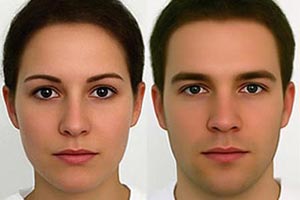Facial expressions are also inherited
Each gesture on your face is passed down in the family. A new study on blind people has shown that people do not necessarily spread facial movements through relatives living around.
 To understand the natural or growth factors affecting facial expression, Israeli researchers investigated 21 people who were born blind with 30 of their relatives. A total of 51 people were recorded when they were happy, sad, exasperated, focusing their thoughts, listening to a creepy story and answering a difficult question.
To understand the natural or growth factors affecting facial expression, Israeli researchers investigated 21 people who were born blind with 30 of their relatives. A total of 51 people were recorded when they were happy, sad, exasperated, focusing their thoughts, listening to a creepy story and answering a difficult question.
Scientists analyzed the three-hour process, paying attention to individual changes on the faces of each person - like lifting an eyebrow, pursing their lips - when they experienced different emotions. Information is loaded into computers to find the order and frequency of these facial movements.
The results show that the blind often have more angry, sad and depressed faces than do strangers.
What a surprising result is that these blind people have never seen relatives, scientist Gili Peleg at Haifa University, Israel, said. It shows that these facial expressions are genetic.
Peleg suggests that genes affect the muscle structure and nerves in the face. This creates biological limitations that create similar facial expressions among people of the same blood.
Peleg also said that the 3 other facial expressions of the blind, such as fun, surprise and disgust, are not much different from those of relatives or strangers. This may be because these emotions are more global and less genetic.
MT
- Differences in facial expressions at pain and ... orgasm between cultures
- Nodding, winking to control the car
- Emotional expressions on the face are hereditary
- Human face can express 21 nuances
- Emotions are coming soon
- The meaning of facial expressions also carries cultural characteristics
- Discovered 'unexpected' benefits of anger
- Looking at the dog face guessing the mood
- Develop technology for manufacturing robots
- Number of leaders revealed on the face?
- Research shows that it is possible to predict the richness and poverty through the face
- How to deal with facial allergies
 Green tea cleans teeth better than mouthwash?
Green tea cleans teeth better than mouthwash? Death kiss: This is why you should not let anyone kiss your baby's lips
Death kiss: This is why you should not let anyone kiss your baby's lips What is salmonellosis?
What is salmonellosis? Caution should be exercised when using aloe vera through eating and drinking
Caution should be exercised when using aloe vera through eating and drinking Top 7 strange psychological effects of the brain that we all have without knowing
Top 7 strange psychological effects of the brain that we all have without knowing  We could start building a colony on Mars with just 22 people!
We could start building a colony on Mars with just 22 people!  CNN reveals a food that is a 'miracle drug' that helps people live to be 100 years old, and that Vietnamese people have been using for a long time.
CNN reveals a food that is a 'miracle drug' that helps people live to be 100 years old, and that Vietnamese people have been using for a long time.  Why are 76% of rich people introverts?
Why are 76% of rich people introverts?  13 extremely popular questions about the world that everyone is confident they know everything about, but are actually completely wrong.
13 extremely popular questions about the world that everyone is confident they know everything about, but are actually completely wrong.  Extremely interesting facts about the legend of bo bo during the subsidy period
Extremely interesting facts about the legend of bo bo during the subsidy period 